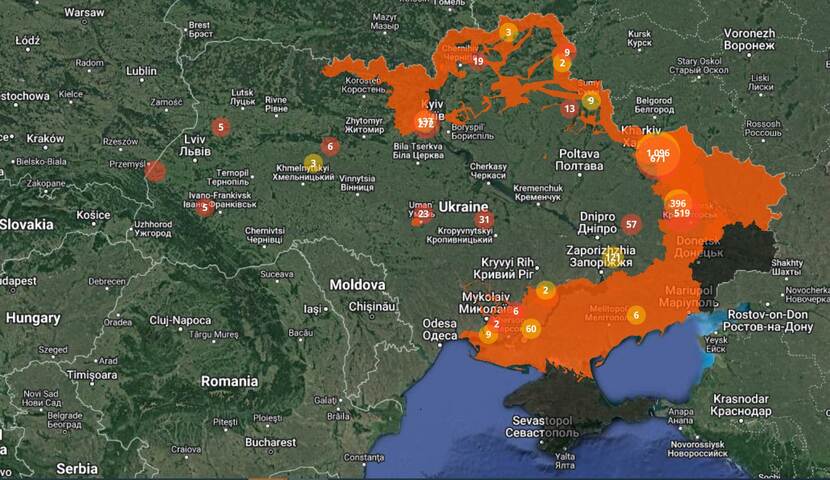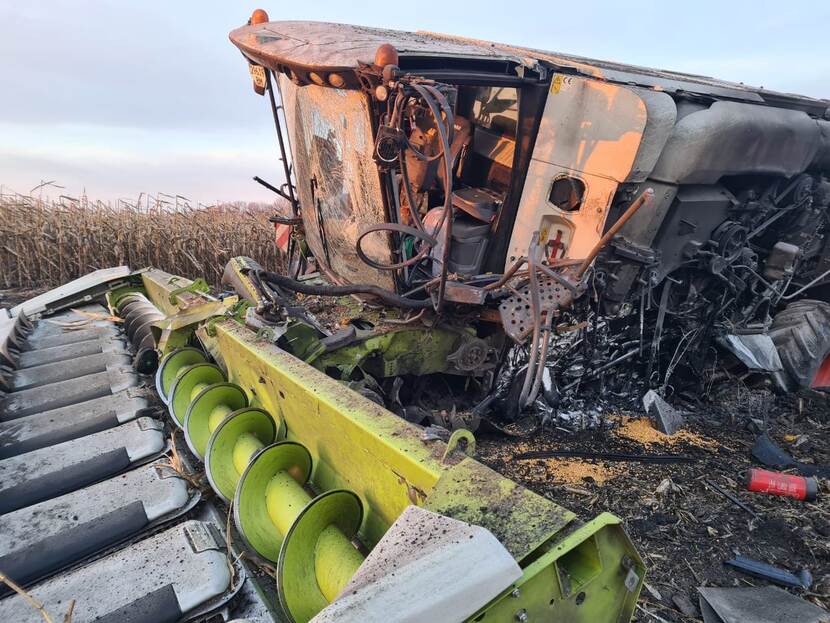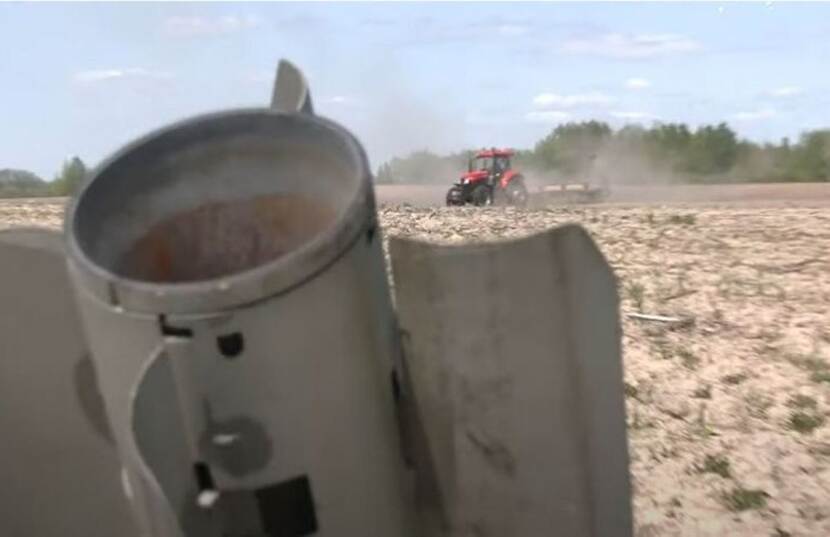Demining in Ukraine
First support package from the Netherlands to Ukraine in 2023 includes € 10 million for demining of agricultural land. Why is this so important for Ukrainian and global food security?

The website of the State Emergency Service provides an interactive map (https://mine.dsns.gov.ua/) with places for detecting explosive objects and dangerous areas.
The map allows to monitor daily the dynamics of demining work by region: the number of departures to demined territories, the area of demined territories and the number of demined explosive devices and the degree of threat from them.

About 30% of the territory of Ukraine, namely 174 thousand km2, is potentially dangerous due to mines
Today, according to Ukrainian authorities, about 30% of the territory of Ukraine, namely 174 thousand km2, is potentially dangerous due to mines. At the same time, the Ministry of Defence of Ukraine has 349 allegedly contaminated and contaminated territories, half of which are agricultural lands. It is obvious that such a complex situation with land mining poses a significant threat to the work of agrarian business, creates risks for the lives of agrarians, leads to the loss of investments and opportunities for the modernization of the agricultural sector.
Every day, special services inspect about 70 hectares of land. In particular, there is an operational response to explosive objects in residential areas, at objects of critical infrastructure, economic purpose, governmental units are involved in these works - State Transport Special Service, State Emergency Service of Ukraine, National Guard, National Police - and humanitarian demining, which involves the complete elimination of all risks with a guarantee of quality demining carried out by non-governmental certified operators.
Today, 144 groups of non-governmental organizations with a total number of about 600 specialists are involved in humanitarian demining, working in all territories, except the war zone and territories adjacent to the contact line. Humanitarian demining begins with a non-technical survey of the territory, identification of dangerous areas, direct demining after identification of damage sites, external quality control. The coordination of these works is carried out by the Mine Action Center, which also conducts monitoring, quality control and certification of future operators. Coordination is also carried out by the Center for Humanitarian Demining of the Emergency Situations of Ukraine until the cleared territories are handed over to the authorities.
In fact, about 10% of the mentioned 174,000 km2 may be contaminated areas, but the identification of directly dangerous areas is a long and expensive process. In order to speed up the stage of non-technical survey, the Ministry of Economy, together with the Ministry of Agrarian Policy and the UNDP program, are already conducting a pilot project in the Kyiv region using modern drones for surveying territories. The approximate cost of a non-technical survey of one hectare can be 5-7 thousand UAH, however, in conditions of high demand and insufficient number of specialists, the cost of demining a hectare may exceed the cost of the land itself.
This situation can be changed thanks to the increase in the number of operators and specialists in the mine action market. Creating a mine countermeasures operator requires at least half a year - 4 months (400 hours) of sapper training and 2-3 months of company certification. The situation is slowing down due to the fact that currently in Ukraine only two bodies provide the appropriate certification - under the Ministry of Defense and the State Emergency Service - and only three centers conduct sapper training. The approximate cost of equipment for one group of sappers of 10 people is 100-150 thousand dollars. Soon there may be another 40 companies operating mine countermeasures in Ukraine, because that is how many are currently undergoing certification and training of specialists.
Currently, the interdepartmental working group on demining, which is coordinated by the Ministry of Economy, has identified 470,000 hectares of potentially contaminated agricultural land as a priority plan - first of all, survey activities will take place on lands where vegetable crops are grown, the second stage - arable land and grain crops, the third - all other agricultural lands. Information is collected through regional military administrations, which have their own data and also collect information from farmers. At the same time, priority demining of agricultural land alone will cost about 1.5 billion dollars, according to the World Bank.
These and other relevant demining issues were discussed by the participants of the meeting of the Business Security and Protection Committee of the European Business Association on the topic "Agrarian business and land demining: challenges and prospects", which took place on March 30 with the participation of the Ministry of Economy, Ministry of Agrarian Policy, Ministry of Defence, Ukroboronprom, and business representatives.
As a result of the meeting, an agreement was reached on the development of the Committee's recommendations for the interdepartmental group on demining and their additional discussion with all involved stakeholders. It should be noted that the member companies of the Association are already involved in the demining process. The main current challenge is to demine agricultural lands quickly and safely. Since there is no experience of such a scale of work in the world, Ukraine has every chance to become a leading player in the global market of demining technologies.
Source: www.eba.com.ua

Meeting with G7 ambassadors regarding humanitarian demining of Ukraine
Under the chairmanship of the First Deputy Prime Minister of Ukraine - Minister of Economy Yulia Svyridenko, a meeting was held with G7 ambassadors regarding humanitarian demining of Ukraine. Denis Bashlyk, Deputy Minister of Agrarian Policy and Food of Ukraine for Digital Development, Digital Transformations and Digitalization, also took part in the event. The Ukrainian side informed the partners about the situation with clearing the land from Russian shells and mines, about the necessary financial, technical and human resources.
"First of all, survey and demining measures will be carried out on agricultural land where vegetable and melon crops are planned - this decision is the most economically justified and will help ensure global food security," noted Denys Bashlyk.
He also added that, given these needs, Ukraine needs financial support, involvement of special equipment for mechanized demining, and help with training people.
In addition, among the plans for the near future: expansion of the pilot project on the development of innovative survey methods, building the capacity of humanitarian demining in priority regions, collection for demining on the United24 platform.
As the First Deputy Prime Minister of Ukraine - Minister of Economy Yuliya Svyridenko reported, for the implementation of these tasks it is proposed to create a structure that will coordinate humanitarian demining of the territory of our state and will effectively implement all related organizational tasks. This body will represent a single, clearly formulated vision of the industry. Its activities are supervised by a supervisory board, to which representatives of partner countries have been invited.
In addition, the G7 ambassadors were offered to take over the mined regions of Ukraine, to help free them from explosive objects. Such cooperation will contribute to the acceleration of rural demining. lands, which will allow Ukrainian agricultural producers to start using them earlier. This, in turn, will have a positive impact on the country's economy and food security in the world.
In general, in view of the priority demining plan, it is planned to survey and demine 470,854 hectares of agricultural land in the Dnipropetrovsk, Kyiv, Mykolaiv, Sumy, Kharkiv, Zaporizhzhya, Kherson, Chernihiv, and Cherkasy regions.
We are mobilising both foreign manufacturers with relevant advanced technologies and Ukrainian ones to demine Ukraine: Yuliia Svyrydenko
Ministry of Economy of Ukraine, posted 03 April 2023
Ukraine, together with international partners, is preparing a pilot project to test the latest technologies in real-world conditions for surveying areas that may be contaminated with explosive ordnance. Following the project, the technologies that demonstrate good results will be used in the humanitarian demining of Ukraine’s territory. This was discussed during a meeting of the Interagency Working Group on Humanitarian Demining on April 3, 2023.
“A very large territory of the country needs to be surveyed and further demined in case of explosive ordnance detection. The action plan for the priority demining of agricultural land alone provides for the survey of more than 470,000 hectares of agricultural land. In order to speed up the process as much as possible, Ukraine needs to attract not only significant financial and traditional technical resources, but also to adopt modern technologies. All the technologies that are available in the world today. Together with our partners, we offer manufacturers who have such technologies to test them in real-world conditions. Technologies that prove their effectiveness will be used in humanitarian demining. In this way, we will be able to significantly speed up the demining process. And the manufacturers will get a positive case study,” said Yuliia Svyrydenko, Head of the Interagency Working Group, First Deputy Prime Minister and Minister of Economy of Ukraine, following the meeting.
During the meeting, the IWG, in particular, supported the decision to identify and approve a suitable site for the project to study the latest technologies of surveying territories for explosive ordnance.
As of today, more than 15 manufacturers from different countries are ready to participate in the pilot project.
In the future, Ukrainian producers may also conduct the relevant tests. As discussed at the IWG meeting, the state is stepping up its work with Ukrainian enterprises that are able and willing to produce the machinery and equipment needed for demining. In the near future, a meeting with manufacturers will be held to discuss the needs of demining operators, the Ministry of Defence, and the State Emergency Service for relevant equipment, the capabilities of manufacturers, and steps for further cooperation.
“In this way, we are mobilising both foreign manufacturers with relevant advanced technologies and Ukrainian ones to demine Ukraine. Our land must be cleared of the consequences of hostilities or strikes on the territories as soon as possible,” said Yuliia Svyrydenko.
As a reminder, a total of 174,000 square kilometres of Ukraine’s territory are currently in need of survey and demining, being potentially contaminated, subject to survey by technical and non-technical means and, in case of detection of explosive ordnance, requiring humanitarian demining.
Ukraine has identified five early recovery priorities
“Currently, Ukraine has identified five early recovery priorities: energy infrastructure, humanitarian demining, housing reconstruction, critical and social infrastructure, and support for the private sector, in particular small and medium-sized businesses. The Government of Ukraine sees great prospects for involving Dutch companies in the recovery process. At the same time, war risk insurance is a key issue for investors. The Government is already working on the creation of a special international trust fund that will allow the G7 export credit agencies, organisations such as MIGA, DFC, as well as international private players in the insurance sector to be involved in insurance,” said Yuliia Svyrydenko First Deputy Prime Minister and Minister of Economy of Ukraine during the meeting with Sigrid Kaag, Deputy Prime Minister and Minister of Finance of the Netherlands.
The state has developed a plan of measures for demining agricultural land, and it must be approved by the National Mine Action Authority
Oleksandr Khorunzhy, the spokesman of the State Emergency Service of Ukraine, stated this during a briefing at the Media Center Ukraine - Ukrinform.
"Today we have to approve the plan of measures for demining agricultural land, and it will be approved by the National Mine Action Authority. The purpose of this plan is to create a safe environment for the population by minimizing the social, economic and environmental impact of GNP on people's lives and activities, the possibility of using agricultural land for its intended purpose, as well as restoring the economic potential of the agricultural sector," he said.
Khorunzhy spoke about the stages of implementation of this plan. First, information will be collected on agricultural lands that require a priority survey for the presence of GNP.
"We receive this information from OVA and analyze it, it is mandatory. Then, on the basis of this information, the categories (sites — ed.) are determined and the demining priority is determined," the spokesperson of the State Emergency Service informed.
He noted that the sites will be assigned three categories of GNP pollution — low, medium, and high. Low is where there is less ammunition, high is where there is a high probability of high explosive contamination.
According to the spokesman, the relevant specialists will use a matrix, and this categorization will be superimposed on the density of GNP pollution.
"Thus, (in this way — ed.) those areas that are our priority and priority for demining will be determined. This is done so that it is possible to demine certain areas as quickly as possible, because a lot of time, effort and resources can be spent on a separate area. And if the site, for example, is not so highly polluted and is a priority in terms of economic justification, then it is probably better to start with it," Khorunzhy said.
The press officer of the State Emergency Service clarified that later the distribution and consolidation of areas for demining by a certain subject of mine action activity, the involvement of the necessary forces and means, and the transfer of the demined territories to the final beneficiaries will take place.
He informed that the coordination of measures on the ground regarding demining will be carried out by OVA, in particular rescue units.
The representative of the State Service of Ukraine for Emergency Situations specified that their forces and means, respectively, are already ready.
Thousand Ha of agricultural land which are de-occupied or are close to the front line still cannot be used for sewn this year. The operators of this land are companies and farmers that rent it from the local landowners. In order to speed up the process of demining the companies initiate demining units within their company structure. Hiring, training and equipping, obtaining the licencing and permission for operating in this absolutely new for the agrarians sector, they not only speed up the demining of the territories they need for growing agriproducts, but also demine the rural areas in the neighbourhood that saves lives of thousand of civilians in the villages, that forbidden to use their land plots for growing their own vegetables and fruit, enter forests, fish in rivers and lakes in order to provide for their families. Last week the Minister of Strategic Industries of Ukraine announced plans of starting production of demining equipment in Ukraine. The partners (public and private) are invited for cooperation.